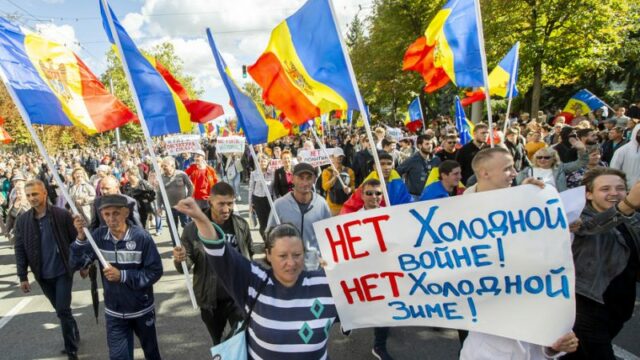
Moldova’s Russophile Left: A Complicated Picture
Publication: Eurasia Daily Monitor Volume: 19 Issue: 156
By:

Spearheading regime-change attempts in Moldova is the Shor Party of businessman Ilan Shor, a presumed billionaire currently operating from Israel. The party has developed its social base through Shor‘s lavish spending on philanthropic projects (see EDM, October 20).
His philanthropies notwithstanding, Shor’s image in Moldova continues to suffer from his association with corruption scandals in 2013–2019, particularly the defrauding of state banks and the tenebrous takeover of Chisinau International Airport. Those deeply convoluted affairs are still poorly understood to this day. Moldova’s then-ruler Vladimir Plahotniuc along with Shor are widely considered as prime suspects. The fallout from these and other affairs forced both to flee abroad in June 2019. Shor had already been sentenced to seven years imprisonment by a court of the first instance in 2017 and was appealing the verdict in a court of the second instance before fleeing the country. Plahotniuc controlled Moldova’s justice system during his rule, and it is widely believed that he inspired both the first-instance verdict and the second-instance court’s inaction, so as to keep his then-ally Shor on a tight leash. Shor was allowed to be elected mayor of Orhei and turn the eponymous district into a political fiefdom. He entered the parliament in 2019 with the Shor Party as Plahotniuc’s ally, only to flee the country that same year.
As an Israeli passport holder, Shor is presumably immune to extradition. He is likely to also hold Russian citizenship, having lived in Russia for several years and was married there. Shor‘s Russian wife is a pop singer who received an award in 2015 directly from President Vladimir Putin.
The Shor Party retains a firm grip on Orhei district. Shor’s continuing investments have turned it into an unusually well-tended district by Moldovan criteria. The Orhei showcase and his welfare programs have apparently mitigated Shor’s negative personal image among impoverished Moldovans. The Shor Party’s political program calls for a “social welfare state,” an active state management of the economy, reviving the model of collective farms and “unconditional preservation of Moldova’s statehood and neutrality” (i.e., not joining Romania or the North Atlantic Treaty Organization) (Partidulsor.md, accessed October 19).
As an upstart political force, the Shor Party seeks to upstage the older Socialist and Communist parties and claim the lead role for itself. These three parties and some smaller ones actively compete for overlapping slices of the Russophile left in Moldova. They also compete over Moscow’s blessings.
Former Moldovan presidents Igor Dodon and Vladimir Voronin, leaders of the Socialist and Communist parties, respectively, are superannuated and cautious figures, as are their leadership teams and core voters. With long track records as play-it-safe parties, they are not eager to follow the young firebrand Shor on a tumultuous regime-change project.
Nor can they be certain as to who might possibly stand behind the expatriated Shor. Whether he is an independent actor seems questionable, considering that he was not independent in Moldova and given his overall adolescent demeanor. The provenance of Shor’s fortune remains unexplained to the public. His wealth (or funding at his disposal) could make his party dominant in a hypothetical alliance with the Socialists and Communists.
The old leftist parties worry that an open embrace of Shor’s party could result in a negative image that transfers to themselves, playing into the government’s hands. Parties joining forces with Shor would stand accused of whitewashing high-level corruption and even seeming to collude in it. These parties would certainly lose more voters than they could gain by associating with Shor‘s party. Entering into an alliance would also allow the Shor Party to poach the old leftist parties’ electorate.
Shor has confirmed the ambition for his party to lead Moldova’s leftist forces. He claims that his party has become Moldova’s largest leftist party by number of members and local party cells. Shor deprecates other leftist party leaders and parliamentary deputies for being fearful of repression and staying out of this struggle, as he complains to Russian state media (RIA Novosti, October 10).
Apprehensive of Shor’s ambitions, the other leftist parties have kept their distance from his party until now. They have not mobilized their own supporters to join the Shor Party’s rallies (see EDM, October 20). Shor has appealed to them in an open letter to “drop their own ambitions,” stop mutual polemics and join forces in a common mission to change the country’s government (Ziarul National, October 13).
The Socialists, Communists and other leftist leaders have ignored this appeal thus far. Instead, the Socialists have set up a consultative group with seven small center-left parties to “meet and exchange ideas about solving the country’s problems”—wording that implies abstention from mass demonstrations for the time being. Crucially, they have not invited Shor’s party to join this consultative group (Unimedia, October 13).
Reflecting their rivalry, the Shor Party and Socialist Party are reaching out to Moscow separately from each other. In early September 2022, a parliamentary delegation from the Shor Party was received by the Russian State Duma’s International Affairs Committee chair Leonid Slutsky. The delegation returned home with a promise that Russia would selectively open its market to some farms from Shor‘s Orhei stronghold—an arrangement that took effect in early October for three farms (TASS; Unimedia, September 10; TASS, October 7). This month, Socialist Party executive secretary Vlad Batrincea was received by senior figures from several parties in the Duma (TASS; Infotag, October 18). Both delegations raised concerns about Russian natural gas to Moldova this winter—a plea that resonates with voters back home more than it would in Moscow.
The Kremlin is not known to be trying to reconcile and unify these rival parties in Moldova. If and when it does try to aggregate them into a united front, that would signal a serious attempt to maximize Russian influence on Moldova’s internal politics.



